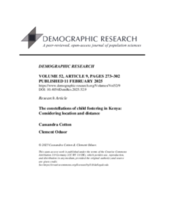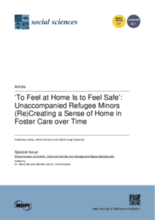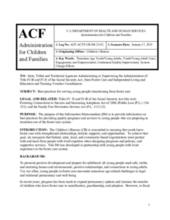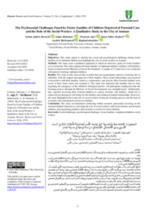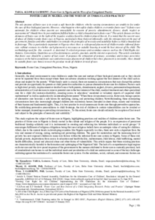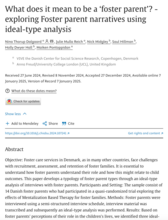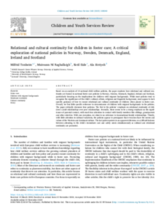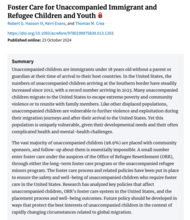Displaying 31 - 40 of 2221
This study, conducted in the UK, aimed to better understand the experiences of foster carers who are caring for children who have experienced trauma and loss.
This study examined the geographical location of fostered children in Kenya, identified who provides their care and the nature of mothers’ relationships with these caregivers, explored transitions and mobility within kin networks, and analyzed how location and distance influence maternal–child contact.
This Norwegian study examines how unaccompanied refugee minors in foster care (re)create a sense of home over time, identifying security, familiarity, and autonomy as key intertwined aspects. It underscores the dynamic role of past experiences, present circumstances, and future aspirations, emphasizing the need for foster parents and child welfare workers to support cultural, relational, and personal continuity.
The purpose of this Information Memorandum (IM) is to provide information on best practices for providing quality programs and services to young people who are preparing to transition out of the foster care system in the U.S.
This study aimed to identify the social and psychological challenges facing foster families of orphaned children and highlight the role of social workers in Amman.
This article examines the challenges of foster care in Nigeria, highlighting risks of abuse—especially in informal placements—and questioning whether foster care is always necessary or suitable. It concludes that foster care should be a last resort, urging preventive measures and, where unavoidable, the use of safe and appropriate foster homes that prioritize the best interests of the child.
This paper develops a typology of foster parent types through an ideal-type analysis of interviews with Danish foster parents.
Kin and fictive kin involvement can be protective following maltreatment and contribute to the development of children’s strengths. Findings show that support from kin may positively influence strength development for youth in foster care. Professionals in foster care should prioritize kin involvement to enhance support and develop youth strengths.
An analysis of 14 national foster care policies across six European countries found that while most acknowledge children’s cultural, ethnic, religious, and linguistic backgrounds, they provide little concrete guidance on ensuring relational and cultural continuity—particularly for children with migrant backgrounds. The study highlights four policy patterns, including prioritizing adult over peer relationships, emphasizing parental contact over extended family or transnational ties, assuming Western cultural norms, and struggling to balance immediate care needs with maintaining cultural and relational connections.
This research analyzed key policies that affect unaccompanied children, the Office of Refugee Resettlement (ORR)'s foster care system in the United States, and the placement process and well-being outcomes.


